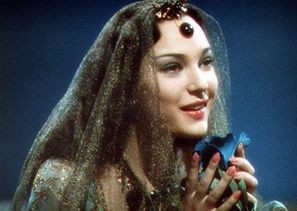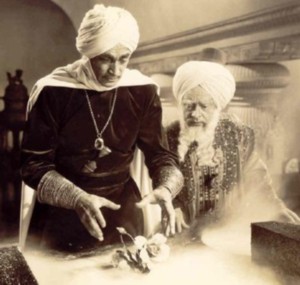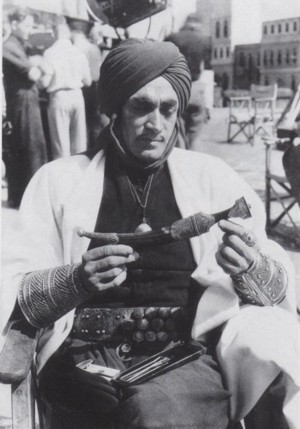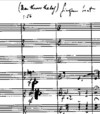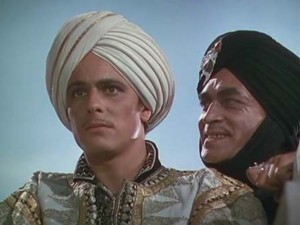| The score for The Thief of Bagdad has been described thusly in a Films In Review article about Rosza: The Thief of Bagdad was more in the spirit of Max Steiner's score for King Kong, "a symphony accompanied by a
movie." Moreover, it showed Rozsa writing in various idioms and styles, from the gently playful Abu's Theme ("I Want
To Be a Sailor") to the fierce passages accompanying his battle with the giant spider in his quest for the AU-Seeing Eye.
And it did what the best filmusic can and must do, telling the entire story as surely as an opera score.
Indeed, the music is
what keeps the giant spider sequence, which looks rather hokey today, exciting to a modem audience, with its pounding
rhythms and savage attack on the instruments, and makes the entire sequence inside the idol just as tense and mysterious
today as it seemed 55 years ago. And all of that music is built, one way or the other, around "I Want To Be A Sailor".
The
"Djinn's Flight Theme" similarly carries the Rex Ingram/genie sequences, despite some model work that now looks rather
crude (if they could've plucked an extra five years out of the last 40 or so, Ray Harryhausen and Charles Schneer should
have found a way to buy the remake rights to the entire movie, as well as the synchronization rights to the score, and just
done it again), and elevates some of the Miles Malleson dialogue (especially the genie's exit speech about the foibles of the
human race) to some of the most memorable in screen history.
(Note: One cryptic published source indicates that Rozsa's
score for the movie was replaced with one written by Hubert Bath ("The Dream of Olwyn") for release in the Far East, but
there's never been any confirmation of this.) The film was released in an era before there were soundtrack recordings, but the score quickly took on a life of its own, with "I Want To Be a Sailor," becoming popular in its own right and the "Djinn's Flight Theme" later becoming the basis for the wartime flyers' tribute.
Originally Oscar Straus was to do the music, but was replaced by the great Miklos Rozsa. Sir Robert Vansittart wrote the lyrics. The film must have originally been fashioned as a musical - there is a full score for many sequences and there are many songs that were composed but ultimately not used. There is a waltz song, Abu's Thief Song, a Love ballad, caravan song, a Djinn song, Market place song, etc. There's also additional lyrics for Abu's "Sailor" song (see grey box).
The music by Miklos Rozsa, Lyrics by R. Denham, Additional lyrics by Wm. Kernell. (It's not apparent if the song (in the grey box) was intended for the movie, or for a song tie-in. The melody isn't the same as for the filmed "Sailor Song."
|
|
Unused Lyrics for: "I Want To Be A Sailor"
Verse I
Some boys want to be a thief,
Doctor, Lawyer, Indian Chief,
But as for me, I've only one plan,
And that is to be
A Sailor Man.
Other fellows may desire
To explore or fight a fire;
Give me a Gale,
Or give me a breeze,
For I want to sail the seven seas:
Chorus I
I want to be a sailor
Sailing to the sea,
No plough-boy, tinker, tailor's
Any fun to be.
Aunts and cousins,
By the bakers dozens,
Drives a man to sea
Or highway robbery.
I want to be a bandit
Can't you understand it?
Sailing to the sea, A pirate free,
What joy for me.
Verse II
So I'm off across the blue,
And many daring deed I'll do.
I'll rant and raid,
With my pirate's blade,
Until there's no thrill
I've not been through.
Maid may weep and maids may mourn
And scan the ocean all forlorn,
But I'll ride the foam,
And never come home,
To stand for the lands-man's
Life I scorn.
Chorus II
I want to be a sailor
That's the life for me.
I want a girl in ev'ry port
Beyond the sea
Land...I'm leaving
Thru' the waves a-weaving
Sing and roll along
A happy sailor song
Just like a feather
Floats my boat in stormy weather
Sailing the sea, the bounding sea
Where I'll be free. |

